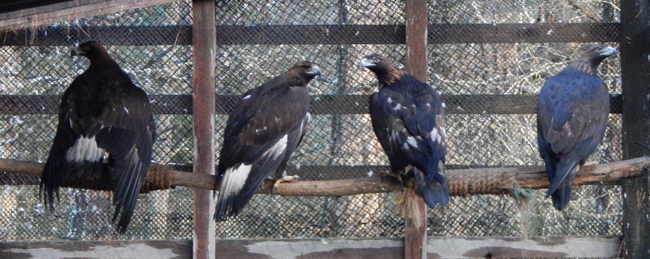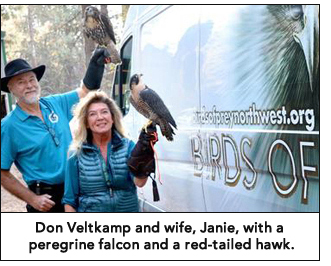

Recycling Roadkill
![]()
Besides helping the district achieve 88% mobility this winter, the St. Maries crew continued its partnership with a local nonprofit dedicated to promoting conservation of birds of prey through educational programs and rehabilitation.
Although it’ll never be included in recruitment videos, operations crews routinely encounter dead animals near the roadway, and often that means laying them to rest in a secluded space nearby.
“I don’t mind it, but I know it can bother other members of my crew,” said Gary Haynes, a senior member at St. Maries. So when Janie Veltkamp with Birds of Prey Northwest approached Haynes about an alternative use of roadkill, Haynes was open to the idea. 
“It is better than letting the meat go to waste,” Haynes said.
Since the arrangement was outlined a few years ago, the St. Maries crew, particularly Haynes, has delivered viable roadkill when possible to the shelter’s processing plant.
“We’re run by volunteers and don’t receive any state or federal support,” Veltkamp said. “Any meat they bring us reduces our food costs.”
According to Veltkamp, Birds of Prey NW spends $40,000 every year on food for a variety of raptors, including eagles (like those pictured at top), hawks and osprey. The shelter's 15 eagles eat 1-2 pounds of red meat per day, and twice as much in the winter to stay warm.
The rehabilitation center takes in nearly 150 injured birds a year in the hopes of helping them heal enough to be released into the wild. Half of the birds are released, but when they can’t be, Veltkamp uses them as training aids in classrooms around North Idaho.
Of the many reasons why birds make it to the shelter, Veltkamp said the most common causes include collisions with vehicles, lead poisoning from feeding on contaminated meat, and poaching.
If motorists should ever encounter an injured raptor on the road, Veltkamp advises them to cover the bird’s head, grab its legs while being careful of any talons, and enclose in a box if possible. Then motorists should call the center’s emergency line at (208) 582-0797.
Birds of Prey Northwest welcomes donations of red meat to help sustain healing birds, and this winter the St. Maries crew was able to deliver 18 deer and two elk.
“Raptors need red meat. Without our help, their success rate wouldn’t be as high,” Haynes. “She does good work, and I’m happy to help.”
Published 05-25-18